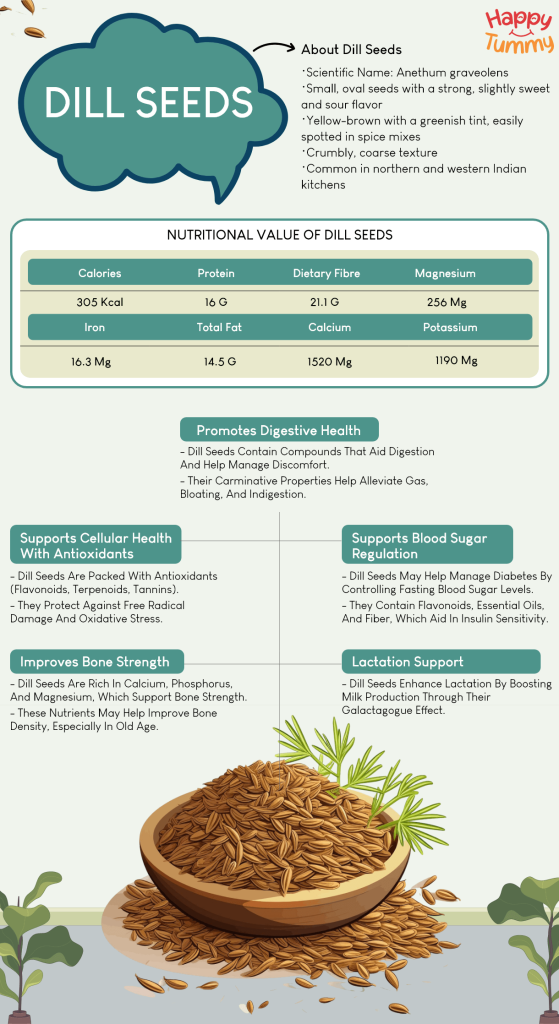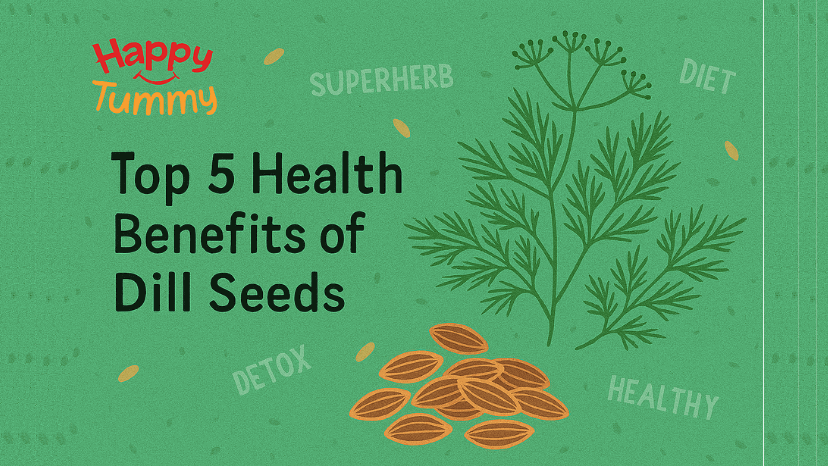Table of Contents
In the more health-conscious world we live in, where we are constantly striving to consume the latest so-called super food, the solution to our health problems could be in the last corner of our pantry. These are small seeds that we will discuss today which are so easily neglected, but can work miracles in health.
It is the dill seeds that look tiny, but it is also a rich source of essential nutrients and health-promoting elements, which have been known in traditional medicine ever since. One can always resort to some exotic or trendy additions, yet it is also a possibility that you will find the solution to what ails you in dill seeds.
These small seeds are great whether it is through digestion, as an anti-inflammatory, or for bone health. So, are you willing to unlock its potential? What do they do to your health?
Continue reading to acquaint you with the top five health benefits of dill seeds and how you can simply assimilate them into your daily routine to live a healthier and more colourful life. To discover, you must read on!
About Dill Seeds
Scientifically known as Anethum graveolens, dill seeds are small, oval seeds, and have a very strong flavour which is slightly sweet and sour. They are yellow-brown, pale with a greenish color, so they can be easily detected in any spice combination.
The seeds are crumbly and coarse in texture. Dill seeds are not hard to find in Indian kitchens and especially in the northern and western parts of the country, where they are added to curries, spice mix, and pickles.
Their special taste goes well with most savoury dishes besides having many health benefits.
Various Names of Dill Seeds in India
Dill seeds are known by different names depending on the various regions of India where the spice is use, and this is an indication of a diverse culinary culture.
- Hindi: Suwa, Sowa
- Bengali: Sowa, Shuva
- Tamil: Supa, Suvai
- Telugu: Suwai
- Marathi: Suva
- Gujarati: Suva, Sowa
- Punjabi: Suwa

Nutrient Profile of Dill Seeds
Below is the nutrient profile of dill seeds, highlighting the key nutrients that contribute to its health benefits.[1]
| Nutrient | Amount |
| Calories | 305 kcal |
| Protein | 16 g |
| Total Fat | 14.5 g |
| Dietary Fiber | 21.1 g |
| Calcium | 1520 mg |
| Iron | 16.3 mg |
| Magnesium | 256 mg |
| Potassium | 1190 mg |
Health Benefits of Dill Seeds
1. Promotes Digestive Health
Dill seeds contain significant amounts of compounds that aid digestion and may help manage digestive discomfort. They can also help manage problems with gas, bloating, and indigestion due to their carminative properties.[2]
The seeds contain vital oils such as carvone and limonene, which can play a crucial role in stimulating digestive enzymes and bile, both of which are essential for digesting food. In relieving intestinal spasms and griping, it helps settle colic. The carminative volatile oil may improve appetite, relieve gas, and aid digestion.[3]
Additionally, the calming and soothing effects of dill seeds may ease the bowel and digestive muscles, thereby mitigating the cramping and tightening of the gut. Traditionally, dill has been used to alleviate problems with colic, indigestion, and diarrhoea, offering a gentle, all-natural digestive health solution.
Aashirvaad Atta, along with a team of expert dietitians, has created the Digestion Quotient, which analyses your digestive health and assigns you a digestive power score between 1 and 100. Get your Digestive Quotient with this 2-minute test.
2. Supports Cellular Health with Antioxidants
Dill seeds contain potent antioxidants, namely flavonoids, terpenoids, and tannins, that may assist your cells in evading the harm from free radicals.[4] Free radicals are unstable molecules that cause oxidative stress, hence resulting in low immunity, lifestyle disorders such as cardiovascular diseases, insulin resistance, obesity, etc, and ageing.
Including dill seeds in your nutrition, you could be enhancing the natural resistance of your body against this harm. They can also regulate the release of the inflammatory molecules in the body, and could be a source of symptomatic relief (in cases like joint pain and swelling).[5]
Taking dill seeds regularly, in food or as a tea, may be a natural and straightforward way to support your body’s ability to manage inflammation.
Not only will these seeds add health and a delicious aroma to your food, but they will also provide long-term sustenance for you and your body, helping to nourish your cells and make you and your cells strong and resilient.
3. Supports Blood Sugar Regulation
Dill seeds may be a promising natural therapy for managing diabetes. The research reveals that dill seeds have the potential to be utilised in the process of controlling fasting blood sugar levels, which is a crucial indicator of blood sugar moderation.
The dill seeds are sources of flavonoids, essential oils, and compounds such as fibre, which helps manage insulin sensitivity.[6]
There is also a possibility that dill seeds can enhance glucose metabolism. Also, dill seeds contain a lot of fibre, a fact that is expected to reduce insulin resistance and gradually increase insulin sensitivity, thus managing the increase in blood sugar levels.[7]
4. Improves Bone Strength
Dill seeds contain beneficial nutrients that may positively impact bone strength. These seeds are a good source of calcium, phosphorus, and magnesium, and thus could be helpful in strengthening bones and acting on bone density, which is quite crucial in old age.[8]
Calcium is essential in the growth and maintenance of healthy bones, and magnesium and phosphorus work synergistically in enhancing calcium absorption. I
While dill seeds show promising potential for supporting bone health, further research is necessary to understand their benefits entirely. Additional studies are needed to confirm their effectiveness and clarify their role in bone health.
5. Lactation Support
Dill seeds can also be used to enhance lactation because of their galactagogue effect to boost and promote the production of milk by breastfeeding mothers. The natural products present in dill seeds, such as flavonoids and volatile oils, are vital in improving the capacity of milk supply, hence their broad adoption by new mothers. [9]
Besides stimulating the process of lactation, dill seeds are also very nutritious, as they contribute to the presence of essential minerals, e.g., magnesium, iron, and calcium. These nutrients not only play a vital role in the post-birth recovery process of the mother, but they also enhance the growth and development of the baby.
Mothers can easily facilitate lactation by using dill seeds in their foods so that they can feed both their children and their bodies.
Ways to Consume Dill Seeds
Integrating dill seeds into everyday meals is both adaptable and straightforward, giving home cooks several ways to gain their nutrients. A few practical suggestions include the following:
- In Cooking. Whole seeds brighten the flavour of curries, soups, stews, and pickles, so they show up often in Indian dishes such as dals, vegetable stir-fries, and chutneys.
- In Tea. One teaspoon of lightly crushed seeds steeped in hot water makes a calming herbal tea that eases digestion, reduces gas, and settles the nerves.
- As an Add-in. Toss a pinch of whole seeds into a smoothie and blend; their mild taste is lost to fruit and greens while adding fibre, vitamins, and minerals.
- Seed Powder. Grind the seeds into a coarse powder and sprinkle over salads, yoghurt, or roasted vegetables for a quick nutrient boost and a pleasant, anise-scented aroma.
No matter which method someone chooses, dill seeds remain a speedy, tasty way to upgrade an already healthful diet and enjoy an impressive range of potential benefits.
Bottom Line
Dill seeds are a small yet remarkably nutrient-rich spice that can help ease digestion, boost immunity, calm inflammation, improve lactation, and even strengthen bones. Whether sprinkled on vegetables, steeped in a tea, or blended into a smoothie, these tiny seeds offer a surprisingly holistic way to improve everyday wellness.
That said, they are most beneficial when paired with a wide range of other healthy foods, so moderation and variety remain key to long-term health. Because everybody responds differently, it is wise to talk with a doctor before introducing dill seeds or any new ingredients, especially if existing health issues or medications are a concern.
Frequently Asked Questions
Dill seeds have been promoted as good to go into your digestive system, and they can help to de-bloat and aid digestion. Their inclusion in a balanced diet and regular physical exercise can possibly help in controlling weight.
No dose of dill seeds. However, you can add one teaspoon of dill seeds crushed to your food or infuse in the form of a tea. Take cautiously, just as with any other herb, and it is also recommended that one follow a balanced diet.
There are no health risks usually associated with Dill seeds. It could, however, result in an allergic reaction or stomach ache in individuals who take excessive amounts of it. Before adding them to your routine, it is best to consult a doctor when you are under any form of medical prescription, medical advice, or have any form of health concern.















